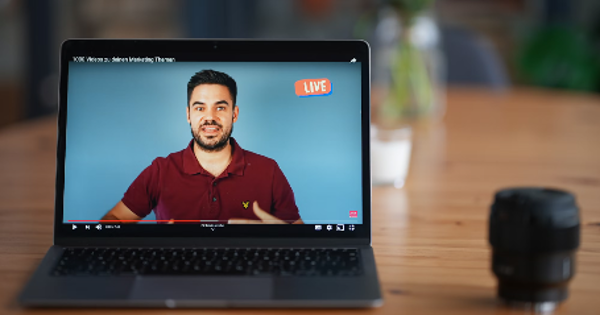5/22/2024
Having a strong online presence is essential for businesses of all sizes. Small and Medium-sized Enterprises (SMEs) often face challenges in competing with larger corporations when it comes to online visibility. This is where content marketing, combined with Search Engine Optimization (SEO), can be a game-changer for SMEs. In this article, we will explore how content marketing can power up your SEO efforts, drive organic traffic, and help your SME thrive on the internet.
Key Takeaways
- Content Marketing and SEO Synergy
- Understanding the Buyer's Journey
- Content Marketing Strategies for SMEs
- Measuring Content Marketing Success
- FAQ
- Conclusion
What is Content Marketing?

man drawing on dry-erase board - Unsplash - Kaleidico
Content marketing is a strategic approach that involves creating and distributing valuable, relevant, and consistent content to attract and engage a target audience. The goal is not to directly promote a product or service but to provide information that is valuable and useful to the audience. Content can take various forms, such as blog posts, articles, videos, infographics, podcasts, and more.
The Relationship between Content Marketing and SEO

SEO text wallpaper - Unsplash - Merakist
Search Engine Optimization (SEO) is the process of optimizing a website or online content to rank higher in search engine results pages (SERPs). Content marketing and SEO are closely intertwined and can complement each other in several ways:
Quality Content Builds Authority
Search engines, especially Google, prioritize content that is valuable, informative, and authoritative. When you consistently produce high-quality content that answers users' questions or solves their problems, you build trust and authority in your niche. This authority enhances your website's chances of ranking higher in search results.
Keywords and Content Alignment

magnifying glass near gray laptop computer - Unspash- Agence Olloweb
Keywords are the terms or phrases users type into search engines to find information. By conducting keyword research and incorporating relevant keywords naturally into your content, you can improve your content's visibility in search results. However, it is essential to strike a balance and avoid keyword stuffing, as search engines penalize such practices. You can find a free SEO tool for SMEs to help in your keyword research journey.
Backlinks and Content
Backlinks, also known as inbound links, are links from other websites to your content. When your content is valuable and informative, other websites are more likely to link back to it as a reference. Backlinks are crucial for SEO, as they signal to search engines that your content is valuable and worth recommending to others.
Understanding the Buyer's Journey
Before delving further into content marketing strategies, it's essential to understand the buyer's journey. The buyer's journey consists of three stages:
- Awareness Stage: The buyer realizes they have a problem or a need and begins searching for information.
- Consideration Stage: The buyer identifies possible solutions and evaluates different options.
- Decision Stage: The buyer decides on a specific solution or product and takes action to make a purchase.
As an SME, you can tailor your content to address the needs of potential customers at each stage of their journey. This approach not only attracts relevant traffic to your website but also increases the chances of converting leads into customers.
Content Marketing Strategies for SMEs

Desk with a planner with the words Content Strategy on it - Photo by Walls.io on Unsplash
Now that we understand the basics, let's dive into some effective content marketing strategies that can boost your SEO efforts as an SME:
Blogging: The Foundation of Content Marketing
Blogging is one of the most powerful content marketing tools for SMEs. Creating and maintaining a blog on your website allows you to regularly publish fresh, valuable content that can attract and engage your target audience. Here's how blogging can help your SEO:
- Target Long-Tail Keywords: Long-tail keywords are longer and more specific search phrases that users use when they are closer to making a purchase decision. By writing blog posts around these keywords, you can capture highly targeted traffic.
- Internal Linking: Internal linking is the practice of linking to other relevant pages within your website. Blogging provides ample opportunities to link to other related blog posts or pages, which improves website navigation and SEO.
Example: A boutique fashion store can publish blog posts on topics like "10 Trendy Summer Outfit Ideas" or "How to Style Your Outfits for Different Occasions."
Infographics and Visual Content
Infographics and visual content are highly shareable and easy to digest. They present information in a visually appealing manner, making complex topics more accessible to readers. When users find your infographics valuable, they are more likely to share them, leading to more backlinks and increased visibility for your website.
Example: An interior design company can create an infographic showcasing "Top 10 Interior Design Trends for 2023" and share it on social media platforms.
Video Marketing

black laptop computer on brown wooden table - Unsplash - Malte Helmhold
Video marketing is booming, and platforms like YouTube have become search engines in their own right. Creating informative and engaging videos related to your industry can not only attract a vast audience but also improve your website's SEO.
Example: A cooking equipment store can create video tutorials on "Mastering the Art of Baking" or "Essential Kitchen Tools for Every Home Cook."
Guest Blogging and Outreach
Collaborating with other websites and industry influencers through guest blogging and outreach can significantly expand your reach and domain authority. When you contribute valuable content to reputable websites, you expose your brand to new audiences and earn valuable backlinks.
Example: A digital marketing agency can write a guest post on "10 Strategies to Boost Your Online Presence" for a popular marketing blog.
Social Media Engagement

space gray iPhone 6 with Facebook log-in display near Social Media scrabble tiles - Unsplash - Firmbee.com
Social media plays a crucial role in content marketing and SEO. Sharing your content on social platforms not only increases its visibility but also encourages user engagement and sharing, leading to more traffic and potential backlinks.
Example: An eco-friendly product store can share blog posts on "Sustainable Living Tips" on their social media channels.
Case Studies and Success Stories
Case studies and success stories showcase real-life examples of how your product or service has benefited customers. These stories add credibility to your brand and can attract potential customers in the consideration stage of the buyer's journey.
Example: An IT consulting firm can publish a case study on "How Our Solutions Transformed a Small Business's IT Infrastructure."
Email Newsletters
Building an email list allows you to nurture leads and maintain a direct line of communication with potential and existing customers. Sending regular newsletters with valuable content keeps your audience engaged and can lead to increased website visits and social sharing.
Example: An online fitness trainer can send out weekly newsletters with workout tips, healthy recipes, and motivational stories.
Measuring and Analyzing Content Marketing Success

a close up of a computer screen with a blurry background - Unsplash - 1981 Digital
To ensure your content marketing efforts are paying off, it's essential to track and measure their success. Here are some key metrics and tools you can use for analysis:
- Website Traffic: Monitor your website's overall traffic and analyze which content pieces drive the most visitors.
- Conversion Rate: Measure how many visitors take the desired action, such as signing up for a newsletter or making a purchase.
- Bounce Rate: Track the percentage of visitors who leave your website after viewing only one page. A high bounce rate may indicate that your content needs improvement.
- Backlinks and Referring Domains: Keep an eye on the number of backlinks and the domains linking to your content.
- Social Media Engagement: Monitor the likes, shares, comments, and retweets of your social media posts to gauge audience engagement.
- Google Analytics: Utilize Google Analytics to gain in-depth insights into your website's performance and user behavior.
- SEO Tools: Use free SEO tools for SMEs to analyze your website's SEO health and track keyword rankings.
Conclusion
Content marketing is a great tool for SMEs to improve their SEO efforts. By creating valuable, informative, and engaging content, SMEs can attract organic traffic, build authority, and establish lasting relationships with their target audience. Remember, content marketing is not an overnight success, but with persistence and dedication, it can drive long-term growth and success for your SME.
Frequently Asked Questions
Content marketing is a strategic approach that involves creating and distributing valuable, relevant, and consistent content to attract and engage a target audience. It differs from traditional advertising by focusing on providing information rather than directly promoting a product or service.
Content marketing and SEO complement each other by building website authority through quality content, aligning with keywords for improved visibility, and attracting valuable backlinks from other websites.
Search engines prioritize valuable and authoritative content. Consistently producing high-quality content that addresses users' questions or problems helps build trust and authority, increasing the website's chances of ranking higher in search results.
SMEs can tailor content to address the three stages of the buyer's journey: awareness, consideration, and decision. This approach attracts relevant traffic and increases the likelihood of converting leads into customers.
Strategies include blogging for targeted keywords and internal linking, creating shareable infographics and visual content, leveraging video marketing, engaging in guest blogging and outreach, utilizing social media for content sharing, showcasing case studies and success stories, and sending regular email newsletters.
SMEs can track metrics such as website traffic, conversion rates, bounce rates, backlinks, and social media engagement. Tools like Google Analytics and free SEO tools for SMEs provide insights into website performance and SEO health.
Content marketing is a long-term strategy that requires persistence and dedication. While it may not provide overnight success, consistent efforts can lead to sustained growth and success for SMEs.
Case studies and success stories showcase real-life examples of how a product or service benefits customers, adding credibility to the brand. They are effective in attracting potential customers in the consideration stage of the buyer's journey.
Building an email list allows SMEs to maintain direct communication with potential and existing customers. Sending regular newsletters with valuable content keeps the audience engaged and can lead to increased website visits and social sharing.
SMEs can use free SEO tools designed for small businesses to analyze their website's SEO health and track keyword rankings. These tools provide valuable insights into the effectiveness of SEO strategies.

